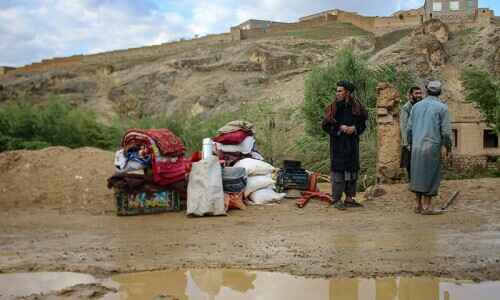In the most recent tragic floods to strike the nation, 66 people were murdered by new floods in the northern Afghan province of Faryab, a local official reported on Sunday.
This month, many flash floods claimed hundreds of lives and flooded farms in a nation where 80% of the population depends on agriculture for a living.
The Faryab governor’s spokesperson, Asmatullah Muradi, stated in a statement that the most recent severe flooding “resulted in human and financial losses” after striking several districts of the province on Saturday night.
He stated, “66 people were killed due to the floods,” while also stating that at least five others were hurt and some were still unaccounted for.
According to him, the floods destroyed hundreds of dwellings, flooded over 1,000 acres of farmland, and killed thousands of animals.
The floods occurred one day after provincial police reported that flash flooding in the western province of Ghor had killed over fifty people.
According to Taliban officials and the UN World Food Programme (WFP), severe flooding in the northern Baghlan province claimed the lives of over 300 people just over a week ago.
Taliban officials have issued a warning that the death toll in areas affected by flooding would increase since efforts to locate the missing and supply help have been impeded by damaged infrastructure.
The number of those killed by the Ghor flooding increased to 55 on Sunday from 50, as stated by a representative for the regional governor, Abdul Wahid Hamas. He continued, “The floods in Ghor completely destroyed more than 3,000 homes.”
The WFP posted videos of muddy water rushing through houses’ walls and churning through the streets of Ghor on the social networking platform X. People who lived in Baghlan, Ghor, Faryab, and other impacted areas lost their houses and means of support, leaving them without anywhere to stay.
Residents of Ghor, Jawan Gul, told AFP on Saturday, “We were inside our home when rain started and all of a sudden, a flash flood came. We were trying to get things out but it washed away our home, our life, everything.”
The World Food Program issued a warning, stating that the country’s already terrible humanitarian situation has been made worse by the recent rains. In Afghanistan, home to almost 40 million people, spring floods are not unusual, but this year’s above-average rainfall has caused catastrophic flash flooding.
Prior to the most recent wave of flooding, officials in ten provinces in Afghanistan said that flooding had claimed the lives of roughly 100 people between the middle of April and the beginning of May.
Afghanistan, which experts say is among the least prepared countries to deal with the effects of climate change, had a protracted drought before the rains arrived.








